Individual Research Report: Entrepreneurial Analysis of Kevin Green
VerifiedAdded on 2023/01/11
|8
|2442
|49
Report
AI Summary
This individual research report delves into the entrepreneurial profile of Kevin Green, a successful British landlord. The report begins with an introduction to entrepreneurship, highlighting its role in business development and value creation. It then provides a detailed overview of Kevin Green's background, including his experience as a property investor and his motivations for success. The report presents interview questions designed to explore Green's business strategies, mindset, and ethical considerations. The analysis of the interview data reveals Green's key traits, such as his mindset for success, innovative strategies, visionary personality, and collaborative approach. The report further connects Green's actions and strategies to relevant entrepreneurial theories, including Schumpeter's innovation theory, human motivation theory, and the diffusion of innovation theory. It concludes by summarizing the key findings and emphasizing the importance of various factors, such as mindset and innovation, in entrepreneurial success. The report uses references from books and journals to support its claims and findings.
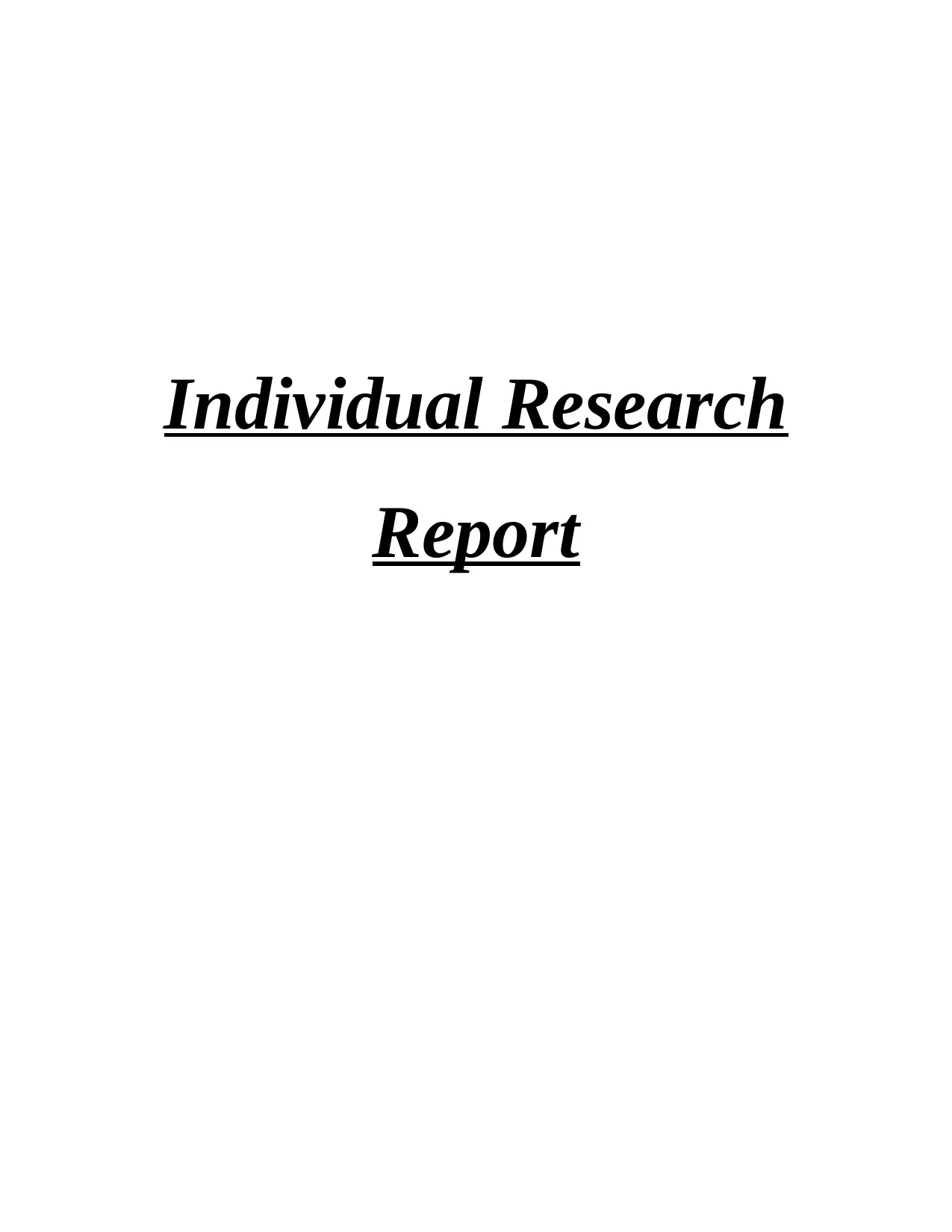
Individual Research
Report
Report
Paraphrase This Document
Need a fresh take? Get an instant paraphrase of this document with our AI Paraphraser

Contents
INTRODUCTION...........................................................................................................................3
About the Entrepreneur..........................................................................................................3
Questions to be asked in the interview...................................................................................3
Ethics to be considered...........................................................................................................4
Analysis of the Data...............................................................................................................4
Relation of the content to the theory......................................................................................6
CONCLUSION................................................................................................................................7
REFERENCES................................................................................................................................8
INTRODUCTION...........................................................................................................................3
About the Entrepreneur..........................................................................................................3
Questions to be asked in the interview...................................................................................3
Ethics to be considered...........................................................................................................4
Analysis of the Data...............................................................................................................4
Relation of the content to the theory......................................................................................6
CONCLUSION................................................................................................................................7
REFERENCES................................................................................................................................8
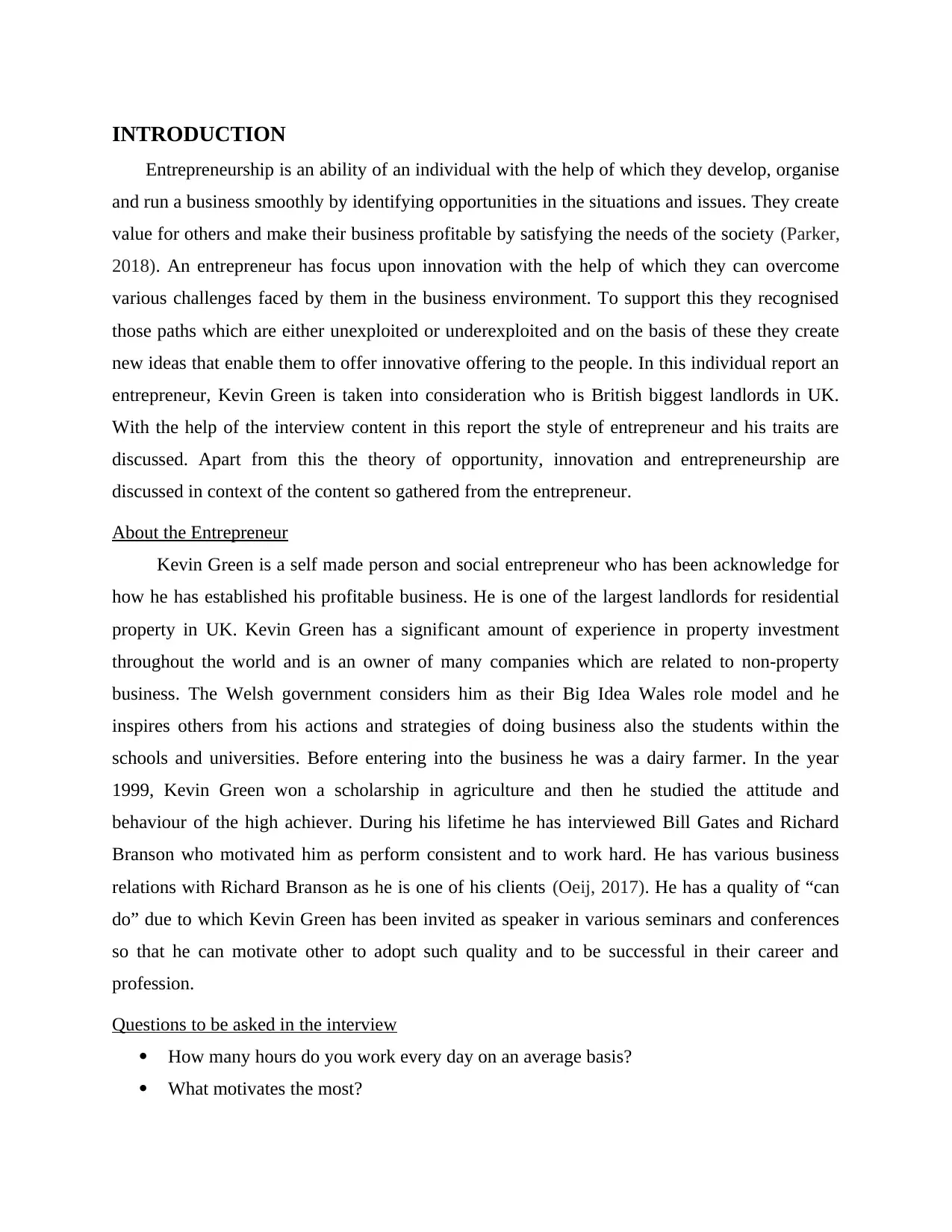
INTRODUCTION
Entrepreneurship is an ability of an individual with the help of which they develop, organise
and run a business smoothly by identifying opportunities in the situations and issues. They create
value for others and make their business profitable by satisfying the needs of the society (Parker,
2018). An entrepreneur has focus upon innovation with the help of which they can overcome
various challenges faced by them in the business environment. To support this they recognised
those paths which are either unexploited or underexploited and on the basis of these they create
new ideas that enable them to offer innovative offering to the people. In this individual report an
entrepreneur, Kevin Green is taken into consideration who is British biggest landlords in UK.
With the help of the interview content in this report the style of entrepreneur and his traits are
discussed. Apart from this the theory of opportunity, innovation and entrepreneurship are
discussed in context of the content so gathered from the entrepreneur.
About the Entrepreneur
Kevin Green is a self made person and social entrepreneur who has been acknowledge for
how he has established his profitable business. He is one of the largest landlords for residential
property in UK. Kevin Green has a significant amount of experience in property investment
throughout the world and is an owner of many companies which are related to non-property
business. The Welsh government considers him as their Big Idea Wales role model and he
inspires others from his actions and strategies of doing business also the students within the
schools and universities. Before entering into the business he was a dairy farmer. In the year
1999, Kevin Green won a scholarship in agriculture and then he studied the attitude and
behaviour of the high achiever. During his lifetime he has interviewed Bill Gates and Richard
Branson who motivated him as perform consistent and to work hard. He has various business
relations with Richard Branson as he is one of his clients (Oeij, 2017). He has a quality of “can
do” due to which Kevin Green has been invited as speaker in various seminars and conferences
so that he can motivate other to adopt such quality and to be successful in their career and
profession.
Questions to be asked in the interview
How many hours do you work every day on an average basis?
What motivates the most?
Entrepreneurship is an ability of an individual with the help of which they develop, organise
and run a business smoothly by identifying opportunities in the situations and issues. They create
value for others and make their business profitable by satisfying the needs of the society (Parker,
2018). An entrepreneur has focus upon innovation with the help of which they can overcome
various challenges faced by them in the business environment. To support this they recognised
those paths which are either unexploited or underexploited and on the basis of these they create
new ideas that enable them to offer innovative offering to the people. In this individual report an
entrepreneur, Kevin Green is taken into consideration who is British biggest landlords in UK.
With the help of the interview content in this report the style of entrepreneur and his traits are
discussed. Apart from this the theory of opportunity, innovation and entrepreneurship are
discussed in context of the content so gathered from the entrepreneur.
About the Entrepreneur
Kevin Green is a self made person and social entrepreneur who has been acknowledge for
how he has established his profitable business. He is one of the largest landlords for residential
property in UK. Kevin Green has a significant amount of experience in property investment
throughout the world and is an owner of many companies which are related to non-property
business. The Welsh government considers him as their Big Idea Wales role model and he
inspires others from his actions and strategies of doing business also the students within the
schools and universities. Before entering into the business he was a dairy farmer. In the year
1999, Kevin Green won a scholarship in agriculture and then he studied the attitude and
behaviour of the high achiever. During his lifetime he has interviewed Bill Gates and Richard
Branson who motivated him as perform consistent and to work hard. He has various business
relations with Richard Branson as he is one of his clients (Oeij, 2017). He has a quality of “can
do” due to which Kevin Green has been invited as speaker in various seminars and conferences
so that he can motivate other to adopt such quality and to be successful in their career and
profession.
Questions to be asked in the interview
How many hours do you work every day on an average basis?
What motivates the most?
⊘ This is a preview!⊘
Do you want full access?
Subscribe today to unlock all pages.

Trusted by 1+ million students worldwide
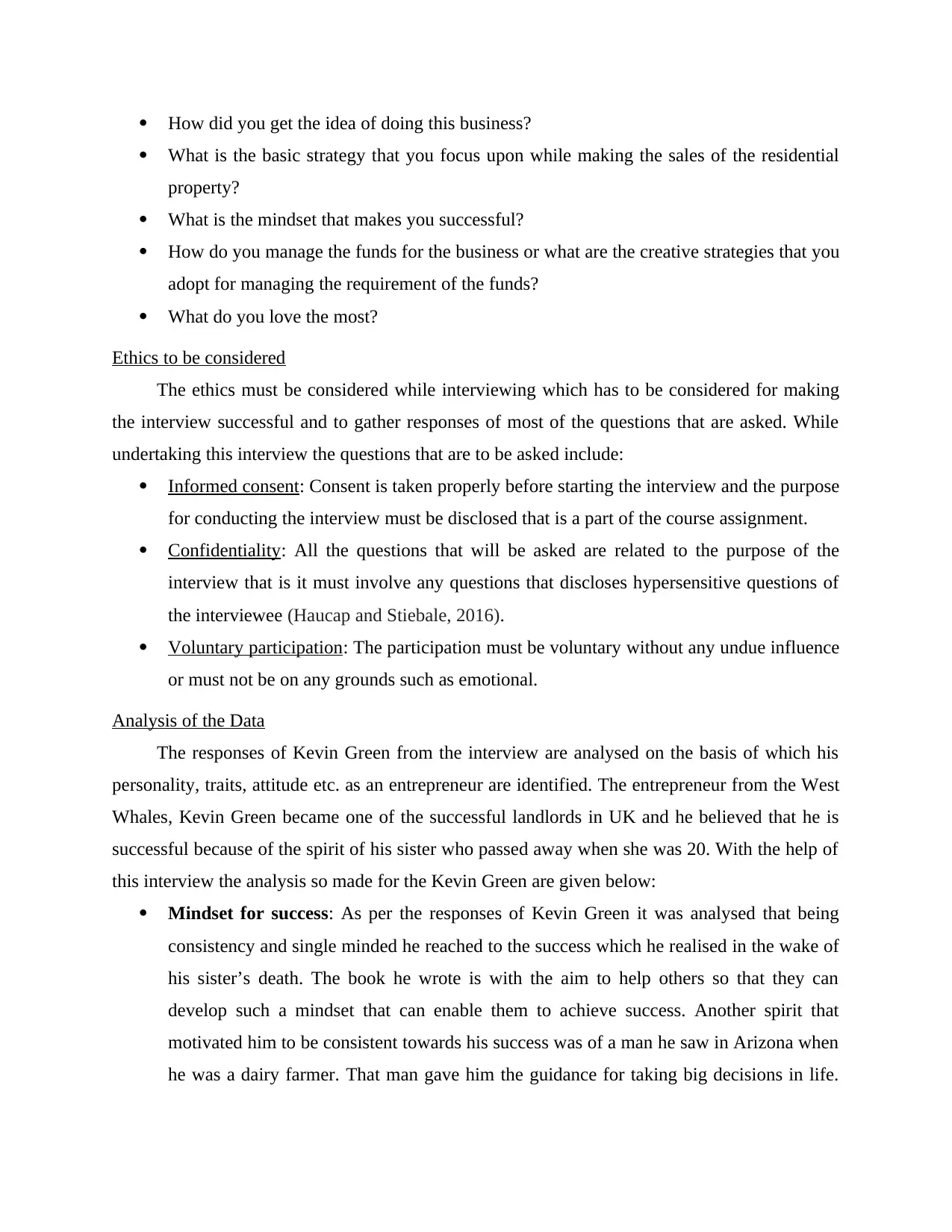
How did you get the idea of doing this business?
What is the basic strategy that you focus upon while making the sales of the residential
property?
What is the mindset that makes you successful?
How do you manage the funds for the business or what are the creative strategies that you
adopt for managing the requirement of the funds?
What do you love the most?
Ethics to be considered
The ethics must be considered while interviewing which has to be considered for making
the interview successful and to gather responses of most of the questions that are asked. While
undertaking this interview the questions that are to be asked include:
Informed consent: Consent is taken properly before starting the interview and the purpose
for conducting the interview must be disclosed that is a part of the course assignment.
Confidentiality: All the questions that will be asked are related to the purpose of the
interview that is it must involve any questions that discloses hypersensitive questions of
the interviewee (Haucap and Stiebale, 2016).
Voluntary participation: The participation must be voluntary without any undue influence
or must not be on any grounds such as emotional.
Analysis of the Data
The responses of Kevin Green from the interview are analysed on the basis of which his
personality, traits, attitude etc. as an entrepreneur are identified. The entrepreneur from the West
Whales, Kevin Green became one of the successful landlords in UK and he believed that he is
successful because of the spirit of his sister who passed away when she was 20. With the help of
this interview the analysis so made for the Kevin Green are given below:
Mindset for success: As per the responses of Kevin Green it was analysed that being
consistency and single minded he reached to the success which he realised in the wake of
his sister’s death. The book he wrote is with the aim to help others so that they can
develop such a mindset that can enable them to achieve success. Another spirit that
motivated him to be consistent towards his success was of a man he saw in Arizona when
he was a dairy farmer. That man gave him the guidance for taking big decisions in life.
What is the basic strategy that you focus upon while making the sales of the residential
property?
What is the mindset that makes you successful?
How do you manage the funds for the business or what are the creative strategies that you
adopt for managing the requirement of the funds?
What do you love the most?
Ethics to be considered
The ethics must be considered while interviewing which has to be considered for making
the interview successful and to gather responses of most of the questions that are asked. While
undertaking this interview the questions that are to be asked include:
Informed consent: Consent is taken properly before starting the interview and the purpose
for conducting the interview must be disclosed that is a part of the course assignment.
Confidentiality: All the questions that will be asked are related to the purpose of the
interview that is it must involve any questions that discloses hypersensitive questions of
the interviewee (Haucap and Stiebale, 2016).
Voluntary participation: The participation must be voluntary without any undue influence
or must not be on any grounds such as emotional.
Analysis of the Data
The responses of Kevin Green from the interview are analysed on the basis of which his
personality, traits, attitude etc. as an entrepreneur are identified. The entrepreneur from the West
Whales, Kevin Green became one of the successful landlords in UK and he believed that he is
successful because of the spirit of his sister who passed away when she was 20. With the help of
this interview the analysis so made for the Kevin Green are given below:
Mindset for success: As per the responses of Kevin Green it was analysed that being
consistency and single minded he reached to the success which he realised in the wake of
his sister’s death. The book he wrote is with the aim to help others so that they can
develop such a mindset that can enable them to achieve success. Another spirit that
motivated him to be consistent towards his success was of a man he saw in Arizona when
he was a dairy farmer. That man gave him the guidance for taking big decisions in life.
Paraphrase This Document
Need a fresh take? Get an instant paraphrase of this document with our AI Paraphraser
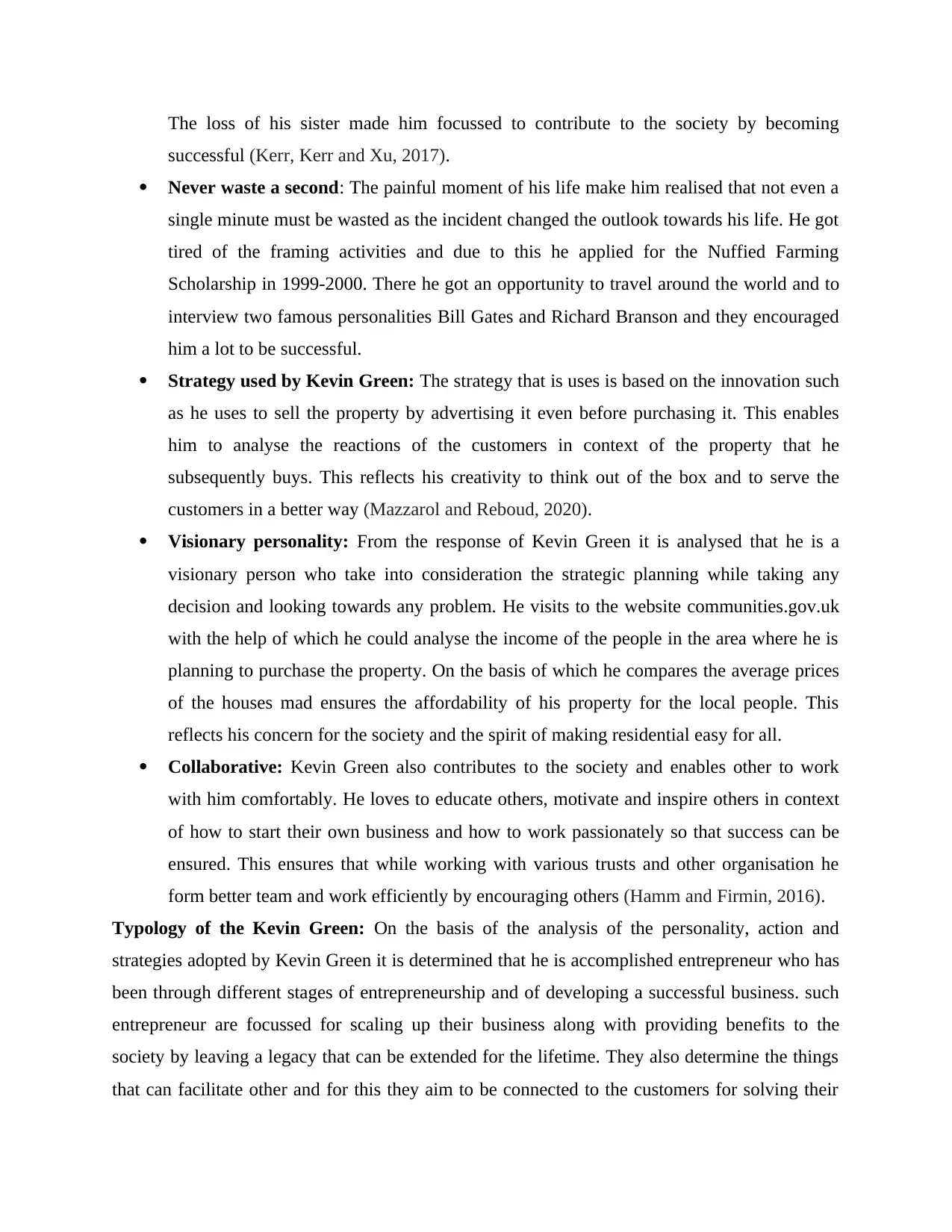
The loss of his sister made him focussed to contribute to the society by becoming
successful (Kerr, Kerr and Xu, 2017).
Never waste a second: The painful moment of his life make him realised that not even a
single minute must be wasted as the incident changed the outlook towards his life. He got
tired of the framing activities and due to this he applied for the Nuffied Farming
Scholarship in 1999-2000. There he got an opportunity to travel around the world and to
interview two famous personalities Bill Gates and Richard Branson and they encouraged
him a lot to be successful.
Strategy used by Kevin Green: The strategy that is uses is based on the innovation such
as he uses to sell the property by advertising it even before purchasing it. This enables
him to analyse the reactions of the customers in context of the property that he
subsequently buys. This reflects his creativity to think out of the box and to serve the
customers in a better way (Mazzarol and Reboud, 2020).
Visionary personality: From the response of Kevin Green it is analysed that he is a
visionary person who take into consideration the strategic planning while taking any
decision and looking towards any problem. He visits to the website communities.gov.uk
with the help of which he could analyse the income of the people in the area where he is
planning to purchase the property. On the basis of which he compares the average prices
of the houses mad ensures the affordability of his property for the local people. This
reflects his concern for the society and the spirit of making residential easy for all.
Collaborative: Kevin Green also contributes to the society and enables other to work
with him comfortably. He loves to educate others, motivate and inspire others in context
of how to start their own business and how to work passionately so that success can be
ensured. This ensures that while working with various trusts and other organisation he
form better team and work efficiently by encouraging others (Hamm and Firmin, 2016).
Typology of the Kevin Green: On the basis of the analysis of the personality, action and
strategies adopted by Kevin Green it is determined that he is accomplished entrepreneur who has
been through different stages of entrepreneurship and of developing a successful business. such
entrepreneur are focussed for scaling up their business along with providing benefits to the
society by leaving a legacy that can be extended for the lifetime. They also determine the things
that can facilitate other and for this they aim to be connected to the customers for solving their
successful (Kerr, Kerr and Xu, 2017).
Never waste a second: The painful moment of his life make him realised that not even a
single minute must be wasted as the incident changed the outlook towards his life. He got
tired of the framing activities and due to this he applied for the Nuffied Farming
Scholarship in 1999-2000. There he got an opportunity to travel around the world and to
interview two famous personalities Bill Gates and Richard Branson and they encouraged
him a lot to be successful.
Strategy used by Kevin Green: The strategy that is uses is based on the innovation such
as he uses to sell the property by advertising it even before purchasing it. This enables
him to analyse the reactions of the customers in context of the property that he
subsequently buys. This reflects his creativity to think out of the box and to serve the
customers in a better way (Mazzarol and Reboud, 2020).
Visionary personality: From the response of Kevin Green it is analysed that he is a
visionary person who take into consideration the strategic planning while taking any
decision and looking towards any problem. He visits to the website communities.gov.uk
with the help of which he could analyse the income of the people in the area where he is
planning to purchase the property. On the basis of which he compares the average prices
of the houses mad ensures the affordability of his property for the local people. This
reflects his concern for the society and the spirit of making residential easy for all.
Collaborative: Kevin Green also contributes to the society and enables other to work
with him comfortably. He loves to educate others, motivate and inspire others in context
of how to start their own business and how to work passionately so that success can be
ensured. This ensures that while working with various trusts and other organisation he
form better team and work efficiently by encouraging others (Hamm and Firmin, 2016).
Typology of the Kevin Green: On the basis of the analysis of the personality, action and
strategies adopted by Kevin Green it is determined that he is accomplished entrepreneur who has
been through different stages of entrepreneurship and of developing a successful business. such
entrepreneur are focussed for scaling up their business along with providing benefits to the
society by leaving a legacy that can be extended for the lifetime. They also determine the things
that can facilitate other and for this they aim to be connected to the customers for solving their
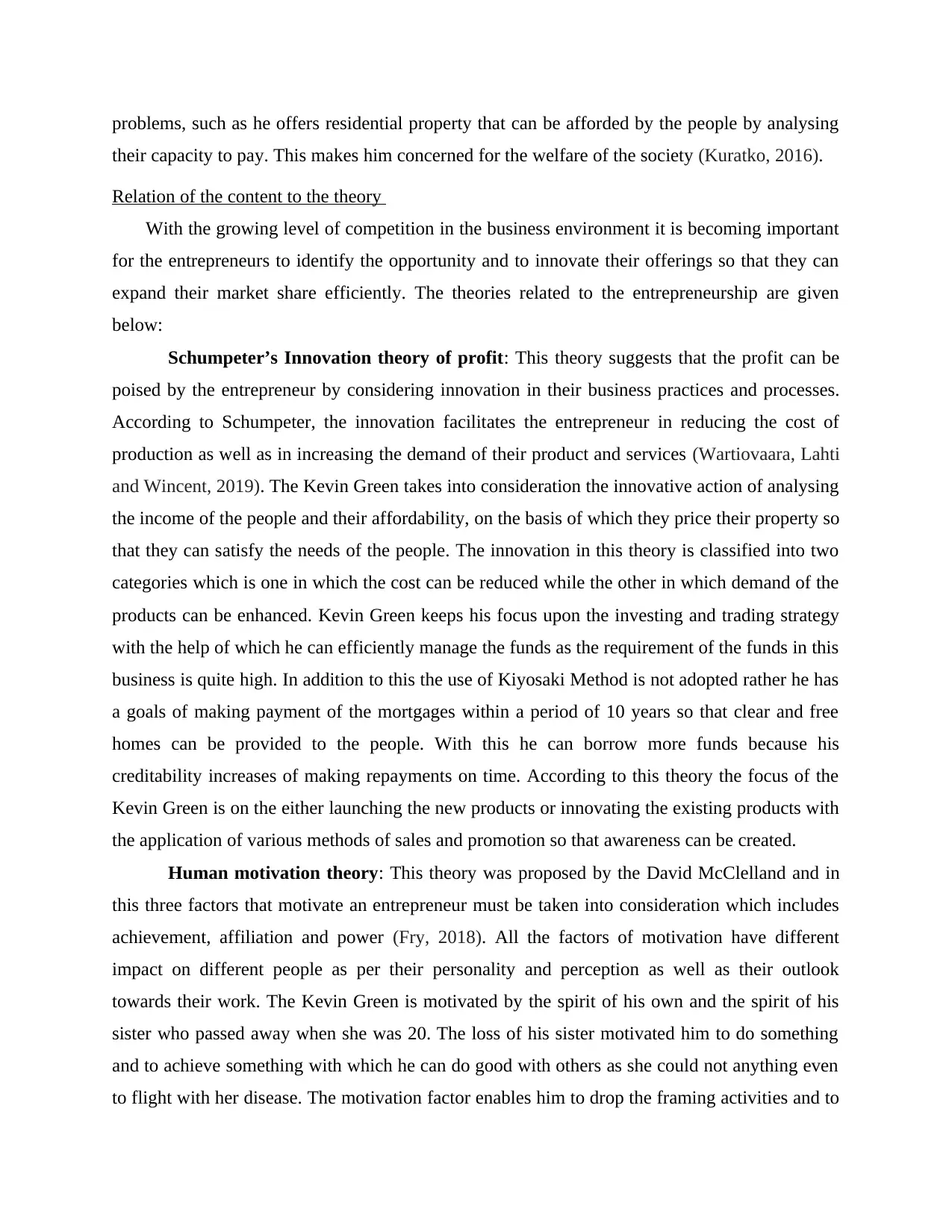
problems, such as he offers residential property that can be afforded by the people by analysing
their capacity to pay. This makes him concerned for the welfare of the society (Kuratko, 2016).
Relation of the content to the theory
With the growing level of competition in the business environment it is becoming important
for the entrepreneurs to identify the opportunity and to innovate their offerings so that they can
expand their market share efficiently. The theories related to the entrepreneurship are given
below:
Schumpeter’s Innovation theory of profit: This theory suggests that the profit can be
poised by the entrepreneur by considering innovation in their business practices and processes.
According to Schumpeter, the innovation facilitates the entrepreneur in reducing the cost of
production as well as in increasing the demand of their product and services (Wartiovaara, Lahti
and Wincent, 2019). The Kevin Green takes into consideration the innovative action of analysing
the income of the people and their affordability, on the basis of which they price their property so
that they can satisfy the needs of the people. The innovation in this theory is classified into two
categories which is one in which the cost can be reduced while the other in which demand of the
products can be enhanced. Kevin Green keeps his focus upon the investing and trading strategy
with the help of which he can efficiently manage the funds as the requirement of the funds in this
business is quite high. In addition to this the use of Kiyosaki Method is not adopted rather he has
a goals of making payment of the mortgages within a period of 10 years so that clear and free
homes can be provided to the people. With this he can borrow more funds because his
creditability increases of making repayments on time. According to this theory the focus of the
Kevin Green is on the either launching the new products or innovating the existing products with
the application of various methods of sales and promotion so that awareness can be created.
Human motivation theory: This theory was proposed by the David McClelland and in
this three factors that motivate an entrepreneur must be taken into consideration which includes
achievement, affiliation and power (Fry, 2018). All the factors of motivation have different
impact on different people as per their personality and perception as well as their outlook
towards their work. The Kevin Green is motivated by the spirit of his own and the spirit of his
sister who passed away when she was 20. The loss of his sister motivated him to do something
and to achieve something with which he can do good with others as she could not anything even
to flight with her disease. The motivation factor enables him to drop the framing activities and to
their capacity to pay. This makes him concerned for the welfare of the society (Kuratko, 2016).
Relation of the content to the theory
With the growing level of competition in the business environment it is becoming important
for the entrepreneurs to identify the opportunity and to innovate their offerings so that they can
expand their market share efficiently. The theories related to the entrepreneurship are given
below:
Schumpeter’s Innovation theory of profit: This theory suggests that the profit can be
poised by the entrepreneur by considering innovation in their business practices and processes.
According to Schumpeter, the innovation facilitates the entrepreneur in reducing the cost of
production as well as in increasing the demand of their product and services (Wartiovaara, Lahti
and Wincent, 2019). The Kevin Green takes into consideration the innovative action of analysing
the income of the people and their affordability, on the basis of which they price their property so
that they can satisfy the needs of the people. The innovation in this theory is classified into two
categories which is one in which the cost can be reduced while the other in which demand of the
products can be enhanced. Kevin Green keeps his focus upon the investing and trading strategy
with the help of which he can efficiently manage the funds as the requirement of the funds in this
business is quite high. In addition to this the use of Kiyosaki Method is not adopted rather he has
a goals of making payment of the mortgages within a period of 10 years so that clear and free
homes can be provided to the people. With this he can borrow more funds because his
creditability increases of making repayments on time. According to this theory the focus of the
Kevin Green is on the either launching the new products or innovating the existing products with
the application of various methods of sales and promotion so that awareness can be created.
Human motivation theory: This theory was proposed by the David McClelland and in
this three factors that motivate an entrepreneur must be taken into consideration which includes
achievement, affiliation and power (Fry, 2018). All the factors of motivation have different
impact on different people as per their personality and perception as well as their outlook
towards their work. The Kevin Green is motivated by the spirit of his own and the spirit of his
sister who passed away when she was 20. The loss of his sister motivated him to do something
and to achieve something with which he can do good with others as she could not anything even
to flight with her disease. The motivation factor enables him to drop the framing activities and to
⊘ This is a preview!⊘
Do you want full access?
Subscribe today to unlock all pages.

Trusted by 1+ million students worldwide
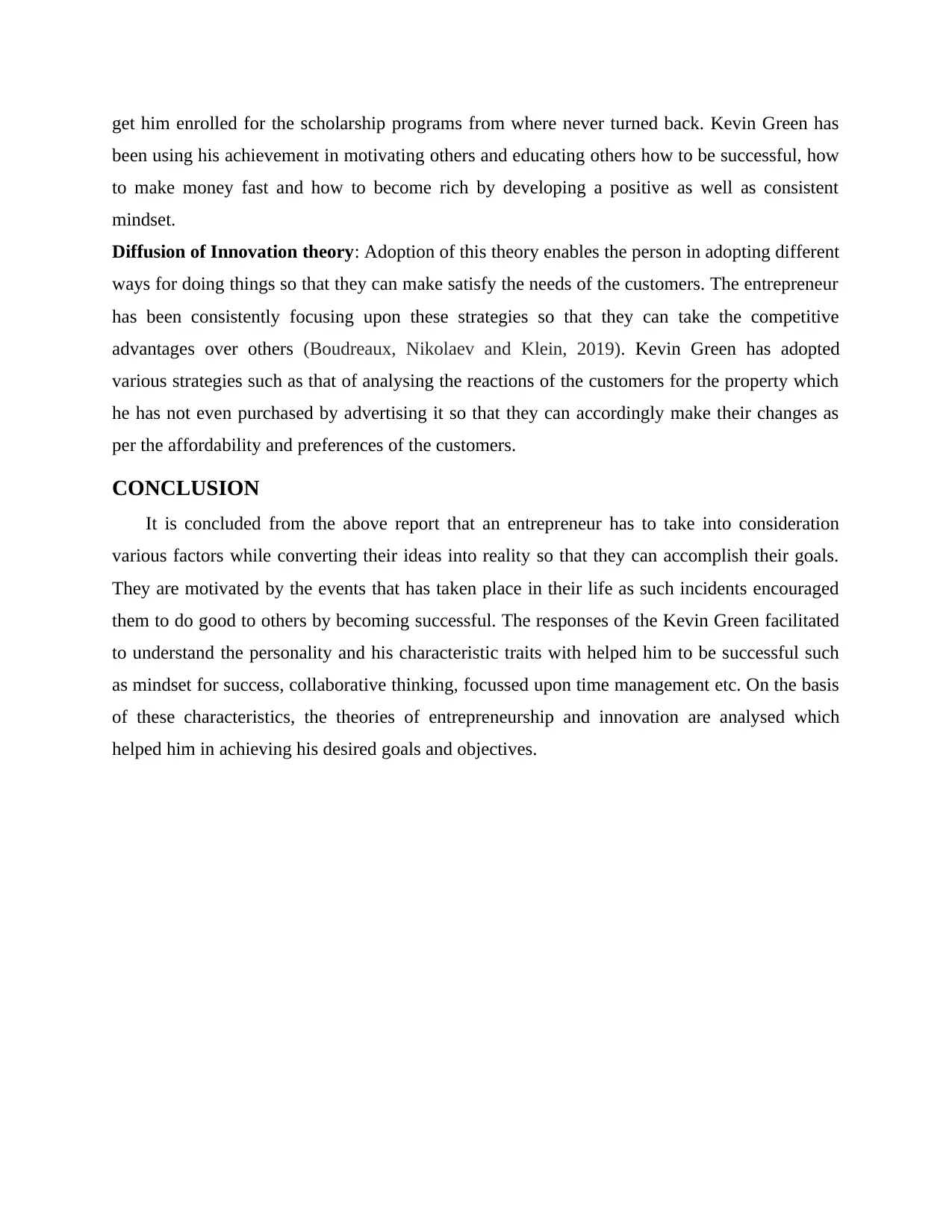
get him enrolled for the scholarship programs from where never turned back. Kevin Green has
been using his achievement in motivating others and educating others how to be successful, how
to make money fast and how to become rich by developing a positive as well as consistent
mindset.
Diffusion of Innovation theory: Adoption of this theory enables the person in adopting different
ways for doing things so that they can make satisfy the needs of the customers. The entrepreneur
has been consistently focusing upon these strategies so that they can take the competitive
advantages over others (Boudreaux, Nikolaev and Klein, 2019). Kevin Green has adopted
various strategies such as that of analysing the reactions of the customers for the property which
he has not even purchased by advertising it so that they can accordingly make their changes as
per the affordability and preferences of the customers.
CONCLUSION
It is concluded from the above report that an entrepreneur has to take into consideration
various factors while converting their ideas into reality so that they can accomplish their goals.
They are motivated by the events that has taken place in their life as such incidents encouraged
them to do good to others by becoming successful. The responses of the Kevin Green facilitated
to understand the personality and his characteristic traits with helped him to be successful such
as mindset for success, collaborative thinking, focussed upon time management etc. On the basis
of these characteristics, the theories of entrepreneurship and innovation are analysed which
helped him in achieving his desired goals and objectives.
been using his achievement in motivating others and educating others how to be successful, how
to make money fast and how to become rich by developing a positive as well as consistent
mindset.
Diffusion of Innovation theory: Adoption of this theory enables the person in adopting different
ways for doing things so that they can make satisfy the needs of the customers. The entrepreneur
has been consistently focusing upon these strategies so that they can take the competitive
advantages over others (Boudreaux, Nikolaev and Klein, 2019). Kevin Green has adopted
various strategies such as that of analysing the reactions of the customers for the property which
he has not even purchased by advertising it so that they can accordingly make their changes as
per the affordability and preferences of the customers.
CONCLUSION
It is concluded from the above report that an entrepreneur has to take into consideration
various factors while converting their ideas into reality so that they can accomplish their goals.
They are motivated by the events that has taken place in their life as such incidents encouraged
them to do good to others by becoming successful. The responses of the Kevin Green facilitated
to understand the personality and his characteristic traits with helped him to be successful such
as mindset for success, collaborative thinking, focussed upon time management etc. On the basis
of these characteristics, the theories of entrepreneurship and innovation are analysed which
helped him in achieving his desired goals and objectives.
Paraphrase This Document
Need a fresh take? Get an instant paraphrase of this document with our AI Paraphraser

REFERENCES
Books and Journal
Boudreaux, C.J., Nikolaev, B.N. and Klein, P., 2019. Socio-cognitive traits and entrepreneurship:
The moderating role of economic institutions. Journal of Business Venturing. 34(1).
pp.178-196.
Fry, R., 2018. 101 great answers to the toughest interview questions. Open Road Media.
Hamm, J.A. and Firmin, R.L., 2016. Disorganization and individual psychotherapy for
schizophrenia: a case report of metacognitive reflection and insight therapy. Journal of
Contemporary Psychotherapy. 46(4). pp.227-234.
Haucap, J. and Stiebale, J., 2016. How mergers affect innovation: Theory and evidence from the
pharmaceutical industry (No. 218). DICE Discussion Paper.
Kerr, S.P., Kerr, W.R. and Xu, T., 2017. Personality traits of entrepreneurs: A review of recent
literature (No. w24097). National Bureau of Economic Research.
Kuratko, D.F., 2016. Entrepreneurship: Theory, process, and practice. Cengage Learning.
Mazzarol, T. and Reboud, S., 2020. Work Book: The Entrepreneur. In Workbook for
Entrepreneurship and Innovation (pp. 9-19). Springer, Singapore.
Oeij, P., Rus, D. and Pot, F.D. eds., 2017. Workplace innovation: Theory, research and practice.
Springer.
Parker, S.C., 2018. The economics of entrepreneurship. Cambridge University Press.
Wartiovaara, M., Lahti, T. and Wincent, J., 2019. The role of inspiration in entrepreneurship:
Theory and the future research agenda. Journal of Business Research. 101. pp.548-554.
Books and Journal
Boudreaux, C.J., Nikolaev, B.N. and Klein, P., 2019. Socio-cognitive traits and entrepreneurship:
The moderating role of economic institutions. Journal of Business Venturing. 34(1).
pp.178-196.
Fry, R., 2018. 101 great answers to the toughest interview questions. Open Road Media.
Hamm, J.A. and Firmin, R.L., 2016. Disorganization and individual psychotherapy for
schizophrenia: a case report of metacognitive reflection and insight therapy. Journal of
Contemporary Psychotherapy. 46(4). pp.227-234.
Haucap, J. and Stiebale, J., 2016. How mergers affect innovation: Theory and evidence from the
pharmaceutical industry (No. 218). DICE Discussion Paper.
Kerr, S.P., Kerr, W.R. and Xu, T., 2017. Personality traits of entrepreneurs: A review of recent
literature (No. w24097). National Bureau of Economic Research.
Kuratko, D.F., 2016. Entrepreneurship: Theory, process, and practice. Cengage Learning.
Mazzarol, T. and Reboud, S., 2020. Work Book: The Entrepreneur. In Workbook for
Entrepreneurship and Innovation (pp. 9-19). Springer, Singapore.
Oeij, P., Rus, D. and Pot, F.D. eds., 2017. Workplace innovation: Theory, research and practice.
Springer.
Parker, S.C., 2018. The economics of entrepreneurship. Cambridge University Press.
Wartiovaara, M., Lahti, T. and Wincent, J., 2019. The role of inspiration in entrepreneurship:
Theory and the future research agenda. Journal of Business Research. 101. pp.548-554.
1 out of 8
Related Documents
Your All-in-One AI-Powered Toolkit for Academic Success.
+13062052269
info@desklib.com
Available 24*7 on WhatsApp / Email
![[object Object]](/_next/static/media/star-bottom.7253800d.svg)
Unlock your academic potential
Copyright © 2020–2025 A2Z Services. All Rights Reserved. Developed and managed by ZUCOL.




